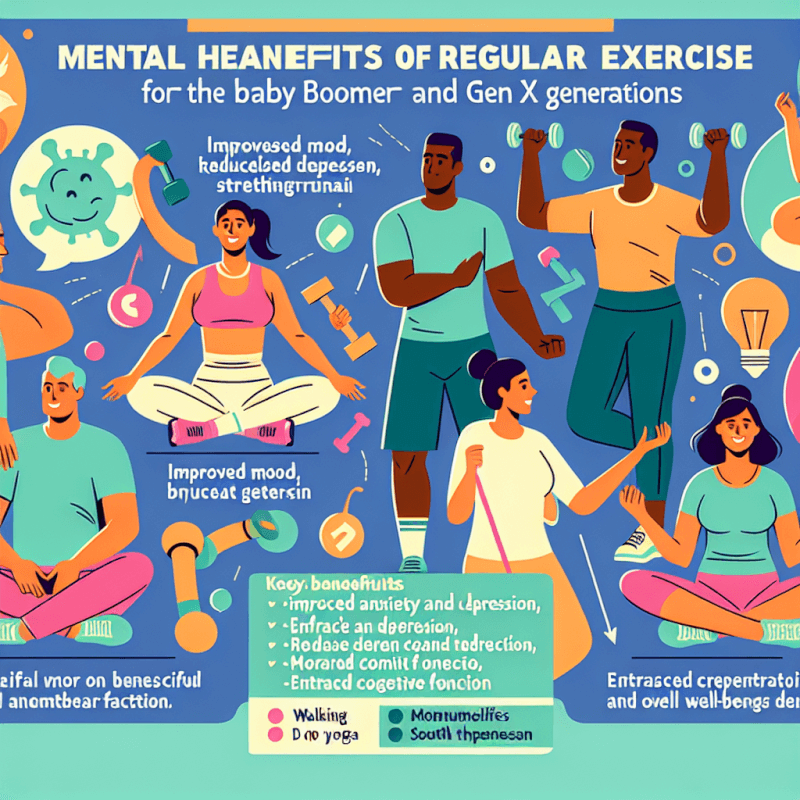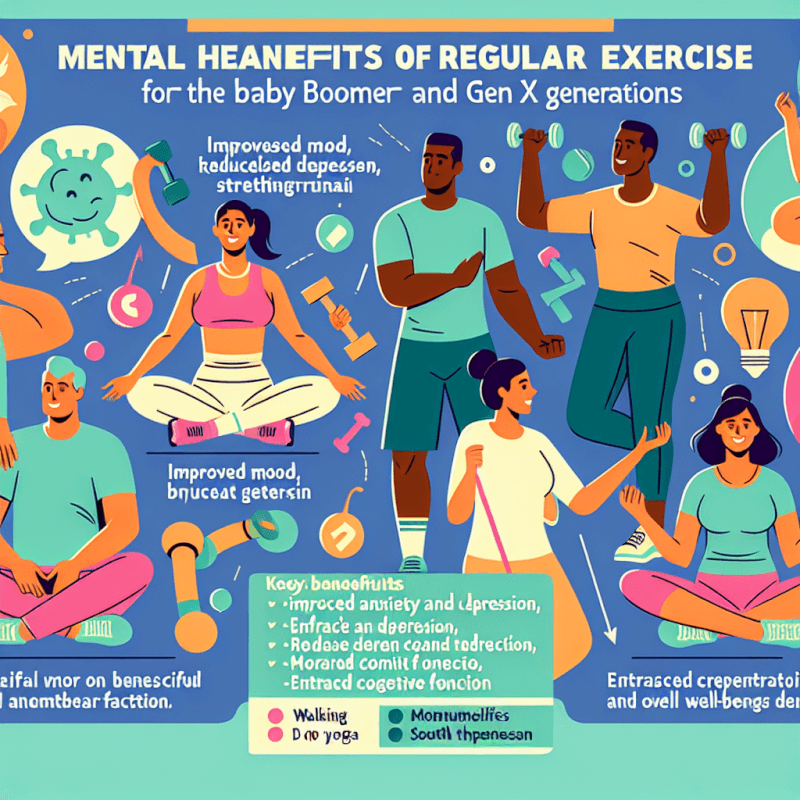Regular exercise not only helps to keep our bodies in shape but also has numerous mental health benefits, particularly for Boomers and Gen Xers. Engaging in physical activity on a consistent basis can improve mood, reduce stress and anxiety, enhance cognitive function, and boost overall well-being. Whether it’s going for a brisk walk, attending a yoga class, or joining a sports team, incorporating exercise into your routine can have a profound positive impact on your mental health, allowing you to thrive and enjoy life to the fullest. Regular exercise offers numerous mental health benefits for Boomers and Gen Xers. In addition to maintaining physical fitness, engaging in regular exercise can greatly contribute to one’s mental well-being and overall quality of life. This article will explore the various ways in which exercise can positively impact mental health, from reducing the risk of depression to promoting longevity and enhancing cognitive function. So, let’s dive in and discover the remarkable mental health benefits that regular exercise can provide.

Reduced Risk of Depression
Regular exercise has been proven to have a significant impact on reducing the risk of depression. Engaging in physical activity releases endorphins, which are often referred to as the “feel-good” chemicals in the brain. These endorphins help improve your mood and create a sense of happiness and well-being. Furthermore, exercise provides a healthy outlet for stress and pent-up emotions, reducing the likelihood of developing depressive symptoms.
Improved mood
When you engage in regular exercise, your brain releases chemicals such as endorphins, dopamine, and serotonin, all of which play a crucial role in regulating your mood. These chemicals can help alleviate feelings of sadness, anxiety, and stress, leaving you with an overall improved mood. Whether it’s going for a jog, hitting the gym, or practicing yoga, incorporating exercise into your daily routine can help uplift your spirits and brighten your outlook on life.
Decreased symptoms of depression
Depression is a common mental health disorder that affects many Boomers and Gen Xers. However, regular exercise has shown to be an effective tool in reducing depressive symptoms. Physical activity helps increase the production of new brain cells and promotes neural connections, which may alleviate symptoms associated with depression. By engaging in regular exercise, you can potentially experience a decrease in feelings of sadness, hopelessness, and lack of energy.
Enhanced self-esteem
Exercise not only benefits your physical appearance but also enhances your self-esteem. Regular physical activity can improve body image perception, making you feel more confident in your own skin. When you exercise, your body releases endorphins, which heighten feelings of self-worth and positivity. This boost in self-esteem can have a profound impact on your overall mental well-being, allowing you to navigate through life with a greater sense of self-assurance and self-acceptance.
Stress Relief
One of the most significant mental health benefits of regular exercise is its ability to effectively reduce and manage stress. Exercise acts as a natural stress reliever, helping you overcome the challenges and pressures of daily life.
Stress reduction and management
When you engage in physical activity, your body releases endorphins, which act as natural stress fighters. These endorphins help reduce the levels of stress hormones such as cortisol, allowing you to feel more relaxed and calm. Regular exercise provides an outlet for built-up stress and tension, promoting a healthier and more balanced state of mind.
Improved sleep quality
Stress and sleep often go hand in hand, with high stress levels leading to poor sleep quality. However, regular exercise can improve sleep patterns and help you achieve a restful night’s sleep. Physical activity raises body temperature, and as it returns to normal, it triggers feelings of relaxation, making it easier for you to fall asleep and enjoy a deep and rejuvenating rest.
Increased relaxation
Engaging in exercises like yoga, tai chi, or meditation can actively promote relaxation and mindfulness. These practices focus on deep breathing and gentle movements, which work to calm the mind and promote a sense of tranquility. Regularly incorporating relaxation exercises into your routine can alleviate stress, anxiety, and tension, leaving you feeling more centered and at peace.
Anxiety Reduction
Anxiety is a prevalent mental health concern among Boomers and Gen Xers. The good news is that regular exercise can help alleviate anxiety symptoms, providing relief and promoting a greater sense of calmness.
Reduced anxiety symptoms
Research has shown that exercise can be just as effective as medication or therapy in reducing anxiety symptoms. By engaging in physical activity, you activate your body’s relaxation response, leading to a decrease in feelings of anxiety. Regular exercise trains your brain to better manage stress and anxiety, allowing you to feel more in control of your emotions.
Increased feelings of calmness
Physical activity triggers the release of endorphins, which not only boost your mood but also induce feelings of calmness and relaxation. These endorphins act as natural sedatives, helping to soothe anxious thoughts and promote a sense of tranquility. So the next time you’re feeling overwhelmed or anxious, engaging in a workout session or taking a brisk walk can work wonders in restoring a sense of calmness and peace.
Enhanced cognitive function
Anxiety can often impair cognitive function, making it challenging to concentrate and think clearly. However, regular exercise has been shown to enhance cognitive function and improve mental clarity. Physical activity increases blood flow to the brain, delivering essential nutrients and oxygen necessary for optimal brain function. By engaging in regular exercise, you can experience improved focus, enhanced memory, and sharper cognitive abilities.
Improved Cognitive Function
Maintaining cognitive function is essential as we age. Regular exercise has been found to play a significant role in preserving and improving cognitive abilities, allowing Boomers and Gen Xers to stay mentally sharp and alert.
Enhanced memory and ability to learn
Engaging in aerobic exercise, such as brisk walking or cycling, has been linked to improvements in memory and learning abilities. Physical activity stimulates the release of growth factors that promote the development of new brain cells and neural connections, leading to better memory retention and increased learning potential.
Increased mental clarity and focus
Regular exercise can significantly improve mental clarity and focus. When you exercise, your brain receives a surge of oxygen and nutrients, enhancing its overall function. This increased blood flow to the brain results in improved concentration and cognitive performance, helping you stay mentally sharp and productive throughout the day.
Slowed cognitive decline
As we age, cognitive decline becomes a concern for many individuals. However, regular exercise has been shown to help slow down the natural decline in cognitive function that occurs with age. Physical activity stimulates the brain’s ability to adapt and form new neural connections, supporting cognitive health and potentially reducing the risk of cognitive disorders such as dementia and Alzheimer’s disease.

Boosted Brain Health
Regular exercise not only improves cognitive function but also promotes overall brain health. Incorporating physical activity into your daily routine can have long-lasting benefits for the health and vitality of your brain.
Promotion of neuroplasticity
Neuroplasticity refers to the brain’s ability to adapt and change throughout life. Regular exercise promotes neuroplasticity, enhancing the brain’s capacity to form new connections and reorganize itself. This increased plasticity allows for improved learning, memory, and overall brain function.
Increased brain volume
Research has shown that engaging in regular exercise can increase brain volume, particularly in regions associated with memory and cognitive function. Physical activity stimulates the production of growth factors that promote the development of new brain cells, leading to an increase in gray matter volume. This increase in brain volume further supports cognitive function and overall brain health.
Reduced risk of neurodegenerative diseases
Regular exercise has been identified as a protective factor against neurodegenerative diseases such as Alzheimer’s and Parkinson’s disease. Engaging in physical activity increases blood flow to the brain, provides essential nutrients, and reduces inflammation, ultimately reducing the risk of developing these debilitating conditions.
Social Interactions and Connection
Regular exercise provides ample opportunities for socializing and connecting with others, fostering a sense of belonging and community.
Opportunities for socializing
Joining group fitness classes, participating in team sports, or even going for a walk with a friend can provide excellent opportunities for socializing. Engaging in exercise activities alongside others allows for connections to be formed, friendships to be nurtured, and a strong sense of community to develop. These social interactions not only benefit your mental well-being but also contribute to a richer and more fulfilling life.
Sense of belonging and community
Regular exercise can help create a sense of belonging and community. Whether it’s joining a fitness group, attending exercise classes, or participating in organized sports, exercising with others who share similar goals and interests can foster a strong sense of camaraderie. This sense of belonging contributes to improved mental well-being, increased social support, and an enhanced overall sense of happiness and fulfillment.
Improved overall well-being
Engaging in regular exercise and being part of a supportive exercise community can greatly improve your overall well-being. The social connections and sense of belonging that exercise promotes can have a positive impact on your mental health, providing a network of individuals who encourage and motivate you to stay active and prioritize your well-being.

Increased Resilience
Regular exercise has been linked to improved coping skills, increased emotional resilience, and enhanced stress resilience, allowing Boomers and Gen Xers to face life’s challenges with greater strength and fortitude.
Improved coping skills
Engaging in regular exercise provides an opportunity to practice and develop healthy coping strategies. Physical activity serves as a valuable outlet for stress, frustration, and emotional turmoil. By engaging in exercise, you learn to channel negative emotions into positive and productive actions, ultimately improving your ability to cope with life’s challenges.
Greater emotional resilience
Regular exercise has been shown to enhance emotional resilience, enabling individuals to bounce back more easily from adversity. Physical activity increases the production of endorphins, which can help regulate emotions and provide a greater sense of emotional stability. This increased emotional resilience allows you to better navigate through life’s ups and downs, maintaining a positive outlook and mental well-being.
Enhanced stress resilience
Stress resilience refers to the ability to cope with and adapt to stressful situations. Regular exercise acts as a natural stress reliever, reducing the impact of stress on both the mind and body. Engaging in physical activity can provide a buffer against the negative effects of stress, enhancing your ability to handle challenging situations and promoting overall mental resilience.
Weight Management and Body Image
Regular exercise plays a crucial role in weight management, body image perception, and overall body confidence. For Boomers and Gen Xers, embracing regular exercise can have profound effects on their physical and mental well-being.
Positive body image
Engaging in regular exercise can lead to positive changes in body composition, increasing muscle tone and reducing body fat. These changes can contribute to a more positive body image, enhancing your perception of yourself and boosting body confidence. Regular exercise can help you develop a healthier and more realistic perspective on your body, leading to improved mental well-being and self-acceptance.
Weight control and maintenance
Physical activity is a key component of weight control and maintenance. Regular exercise helps burn calories, increase metabolism, and build lean muscle mass, contributing to weight loss or weight maintenance. By incorporating exercise into your daily routine, you can better manage your weight and reduce the risk of weight-related health issues, all while boosting your self-esteem and mental well-being.
Improved body confidence
Regular exercise not only improves physical fitness but also enhances body confidence. When you engage in physical activity, you become more in tune with your body and its capabilities. Achieving personal fitness goals, whether it’s running a certain distance or mastering a challenging yoga pose, instills a sense of achievement and pride. This improved body confidence can positively impact your mental well-being, allowing you to feel more comfortable and confident in your own skin.

Endorphin Release
Engaging in regular exercise triggers the release of endorphins, natural chemicals that act as mood boosters and pain relievers.
Natural mood booster
When you exercise, your body releases endorphins, which are often referred to as nature’s mood boosters. These endorphins promote feelings of happiness, joy, and euphoria, helping alleviate feelings of sadness, anxiety, and stress. By incorporating regular exercise into your routine, you can harness the power of endorphins and experience a natural and sustainable mood boost.
Increase in feelings of happiness
Endorphins not only boost your mood but also contribute to an overall increase in feelings of happiness. Regular exercise provides you with a consistent and reliable source of endorphins, allowing you to experience long-lasting feelings of joy and contentment. By prioritizing exercise in your daily life, you can cultivate a sense of happiness that transcends temporary external circumstances.
Pain relief
Apart from their mood-boosting effects, endorphins also act as natural pain relievers. When you engage in physical activity, such as cardiovascular exercises or strength training, your body releases endorphins that bind to opioid receptors, decreasing pain perception. Regular exercise can help alleviate chronic pain conditions, promote faster recovery from injuries, and improve overall pain management.
Longevity and Quality of Life
Lastly, regular exercise is associated with increased longevity and improved overall health and well-being. By prioritizing physical activity, Boomers and Gen Xers can fuel their bodies and minds, ensuring a life filled with vitality and longevity.
Delayed aging process
Regular exercise can slow down the aging process, both physically and mentally. Physical activity improves cardiovascular health, promotes healthy circulation, and helps control blood pressure, reducing the risk of age-related diseases. Furthermore, exercise supports brain health and cognitive function, contributing to a more youthful and vibrant mind. By incorporating regular exercise into your lifestyle, you can enhance both the quantity and quality of your years.
Increased life expectancy
Engaging in regular exercise has been linked to increased life expectancy. Physical activity reduces the risk of chronic diseases, such as cardiovascular disease, diabetes, and certain types of cancer, all of which can have a significant impact on life expectancy. By prioritizing exercise, Boomers and Gen Xers can enhance their chances of living long and fulfilling lives, filled with vitality and good health.
Improved overall health and well-being
Regular exercise contributes to improved overall health and well-being. Physical activity strengthens the immune system, reduces the risk of chronic diseases, and improves mental health. By engaging in regular exercise, you can enjoy increased energy levels, improved sleep quality, and enhanced physical and mental resilience. Exercise truly has the power to transform not only your body but also your entire well-being.
In conclusion, regular exercise offers an array of mental health benefits for Boomers and Gen Xers. From reducing the risk of depression to promoting longevity and enhancing cognitive function, the positive impact of physical activity on mental well-being is undeniable. By incorporating regular exercise into your daily routine, you can boost your mood, reduce stress and anxiety, improve cognitive abilities, foster social connections, and achieve a greater sense of overall well-being. So grab your sneakers, embrace the joy of movement, and experience the transformative power of exercise on both your body and mind. Your mental health will thank you.



